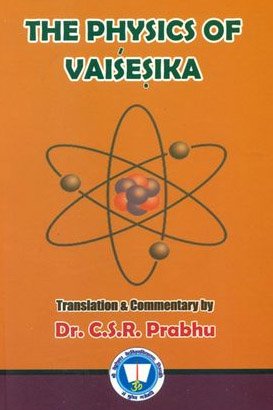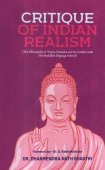Vaisheshika-sutra, Vaiśeṣika-sūtra, Vaiśeṣikasūtra, Vaiseshikasutra, Vaisheshikasutra: 4 definitions
Introduction:
Vaisheshika-sutra means something in Hinduism, Sanskrit. If you want to know the exact meaning, history, etymology or English translation of this term then check out the descriptions on this page. Add your comment or reference to a book if you want to contribute to this summary article.
The Sanskrit terms Vaiśeṣika-sūtra and Vaiśeṣikasūtra can be transliterated into English as Vaisesika-sutra or Vaisheshika-sutra or Vaisesikasutra or Vaisheshikasutra, using the IAST transliteration scheme (?).
In Hinduism
Vaisheshika (school of philosophy)
Source: Shodhganga: A study of Nyāya-vaiśeṣika categories (vaisesika)Vaiśeṣikasūtra (वैशेषिकसूत्र) consists of ten chapters. In the first chapter the five categories, viz. substance, quality, action, generality and particularity are discussed. In chapter II we find the different substances. The mind along with the objects of the senses and the nature of inference are discussed in chapter III. The atomic form of the Universe is the main topic of chapter IV. In chapter V discusses about the nature and kinds of action. Chapter VI discusses the ethical problems. In chapter VII, there are discussions about quality, self and inherence. The last three chapters are logical and the problems of perception, inference and causality are treated here.

Vaisheshika (वैशेषिक, vaiśeṣika) refers to a school of orthodox Hindu philosophy (astika), drawing its subject-matter from the Upanishads. Vaisheshika deals with subjects such as logic, epistemology, philosophy and expounds concepts similar to Buddhism in nature
General definition (in Hinduism)
Source: WikiPedia: HinduismVaiśeṣika Sūtra or Kanada sutra is the standard text of Vaisheshika school of philosophy. The sutra was authored by Kanada, who is thought to have flourished before the advent of Buddhism. Number of scholars have commented on it since the beginning of Christian era, the earliest commentary being Svartha Dharma Sangraha of Prashastapada.
The Vaiseshika sutra proclaims the futility of life in the temporary world (maya) and proposes that an understanding of god can free an individual from Karma, following which liberation will ensue. Major ideas contained in the Vaisheshika Sutra are:
- There are nine classes of realities: four classes of atoms (earth, water, light and air), space (akasha), time (kāla), direction (dik), infinity of souls (Atman), mind (manas).
- Individual souls are eternal and pervade material body for a time.
- There are seven categories (padārtha) of experience — substance, quality, activity, generality, particularity, inherence and non-existence.
Languages of India and abroad
Sanskrit dictionary
Source: Cologne Digital Sanskrit Dictionaries: Aufrecht Catalogus Catalogorum1) Vaiśeṣikasūtra (वैशेषिकसूत्र) as mentioned in Aufrecht’s Catalogus Catalogorum:—by Kaṇāda. Hall. p. 64. Khn. 66. K. 160. Kh. 89. Report. Xxvi (and—[commentary]). Ben. 182. 207. 220. NW. 366. Np. I, 34. 36. Oppert. 618. 676. 7276. Ii, 1042.
—[commentary] Pheh. 13. NW. 376.
—[commentary] by Udayanācārya. Oppert. Ii, 1041.
—[commentary] by Candrānanda. Kh. 89,
—[commentary] by Jayanārāyaṇa. NW. 378.
—[commentary] Praśastapādabhāṣya (q. v.) by Praśastapādācārya.
—[commentary] by Raghudeva. Hall. p. 68. NW. 362.
—[commentary] Vaiśeṣikasūtropaskāra by Śaṅkaramiśra. Hall. p. 68. L. 1606. Khn. 60. Tu7b. 19. NW. 362. Oudh. Xviii, 64. Np. I, 28. 36.
2) Vaiśeṣikasūtra (वैशेषिकसूत्र):—by Kaṇāda. Io. 3023.
—[commentary] Vaiśeṣikasūtropaskāra by Śaṅkaramiśra, son of Bhavanāthamiśra. Io. 232. 1698. Stein 153.
3) Vaiśeṣikasūtra (वैशेषिकसूत्र):—by Kaṇāda. Ulwar 600.
—[commentary] Vaiśeṣikasūtropaskāra by Śaṅkaramiśra, son of Bhavanātha. Ulwar 610.
4) Vaiśeṣikasūtra (वैशेषिकसूत्र):—by Kaṇāda. C. Bhāṣyaratna. Cs 3, 445 (inc.). C. Vaiśeṣikasūtropaskāra by Śaṅkaramiśra, son of Bhavanātha. As p. 187. Cs 3, 418. 420. Tod 137.
Source: Cologne Digital Sanskrit Dictionaries: Monier-Williams Sanskrit-English DictionaryVaiśeṣikasūtra (वैशेषिकसूत्र):—[=vaiśeṣika-sūtra] [from vaiśeṣika] n. the aphorisms of the Vaiśeṣika (branch of the Nyāya philosophy, which have been commented on by a triple set of commentaries, and expounded in various works, of which the best known are the Bhāṣā-pariccheda with its commentary, called Siddhānta-muktāvalī, and the Tarkasaṃgraha), [Indian Wisdom, by Sir M. Monier-Williams 60 n. 1]
Sanskrit, also spelled संस्कृतम् (saṃskṛtam), is an ancient language of India commonly seen as the grandmother of the Indo-European language family (even English!). Closely allied with Prakrit and Pali, Sanskrit is more exhaustive in both grammar and terms and has the most extensive collection of literature in the world, greatly surpassing its sister-languages Greek and Latin.
See also (Relevant definitions)
Partial matches: Vaisheshika, Sutra.
Full-text (+72): Kanada, Parimana, Padarthadharmasamgraha, Prashastapadabhashya, Guna, Samjnakarman, Vaisheshikasutropaskara, Sarvajniya, Sasnavat, Svapnantika, Avasphurjathu, Rupasparshavat, Visphurja, Samanya, Sopakhya, Samyoga, Kala, Ruparasagandhasparshavat, Dik, Visphotana.
Relevant text
Search found 32 books and stories containing Vaisheshika-sutra, Vaisesika-sutra, Vaiśeṣika-sūtra, Vaiśeṣikasūtra, Vaiseshikasutra, Vaisesikasutra, Vaisheshikasutra; (plurals include: sutras, sūtras, Vaiśeṣikasūtras, Vaiseshikasutras, Vaisesikasutras, Vaisheshikasutras). You can also click to the full overview containing English textual excerpts. Below are direct links for the most relevant articles:
The validity of Anumana (inference) in Nyaya system (by Babu C. D)
A History of Indian Philosophy Volume 1 (by Surendranath Dasgupta)
Part 3 - Does Vaiśeṣika represent an Old School of Mīmāṃsā? < [Chapter VIII - The Nyāya-Vaiśeṣika Philosophy]
Part 6 - Caraka, Nyāya sūtras and Vaiśeṣika sūtras < [Chapter VIII - The Nyāya-Vaiśeṣika Philosophy]
Part 2 - Nyāya and Vaiśeṣika sūtras < [Chapter VIII - The Nyāya-Vaiśeṣika Philosophy]
Philosophy of Charaka-samhita (by Asokan. G)
Enumeration of attributes (guṇa) < [Chapter 2 - Fundamental Categories]
Fundamental Categories (padārtha or tattva) [in Charaka philosophy] < [Chapter 2 - Fundamental Categories]
Proof for the existence of the inner self < [Chapter 5 - The Complete Man]
Nyaya-Vaisheshika categories (Study) (by Diptimani Goswami)
Historical Survey of Vaiśeṣika System < [Chapter 1 - Introduction]
Qualities (10-11): Paratva and Aparatva (Priority and Posteriority) < [Chapter 4 - Quality and Action]
Categories in the Vaiśeṣika system < [Chapter 2 - Salient features of Nyāya-Vaiśeṣika System]
Puranic encyclopaedia (by Vettam Mani)
A History of Indian Philosophy Volume 2 (by Surendranath Dasgupta)
Part 12 - The Psychological Views and other Ontological Categories < [Chapter XIII - Speculations in the Medical Schools]
Part 10 - The Circulatory and the Nervous System < [Chapter XIII - Speculations in the Medical Schools]
Related products
